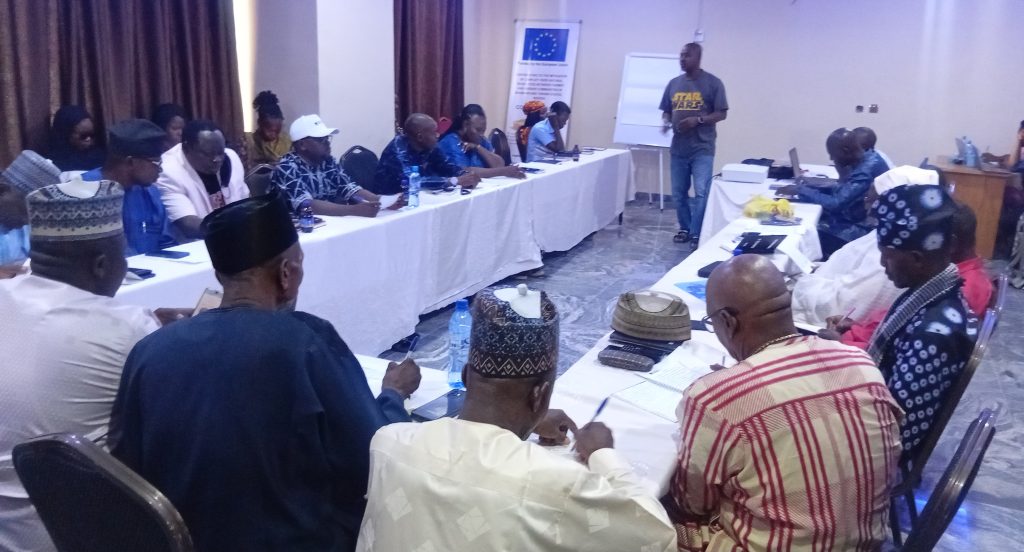Post COMITAS: Peace Bureau, ALGON to Sustain Improved Farmer-Herder Relations in Taraba
By Christiana Babayo.
The Taraba State Bureau for Peace and Conflict Management and the Association of Local Governments in Nigeria (ALGON) Taraba Chapter have agreed to collaborate on sustaining the improved farmer-herder relations achieved through the COMITAS project (Contributing to the Mitigation of Conflicts over Natural Resources Between Farmer/Herder Communities in Adamawa and Taraba states) funded by the European Union and implemented by Search for Common Ground.
This agreement was reached during a three-day training organized by Search to enhance the understanding of local government chairmen and the Peace Bureau on the Common Ground Approach, conflict sensitivity, and early warning systems.
Bishop Solomon Innocent, Chairman of the Bureau for Peace and Conflict Management, commended the EU and Search for Common Ground for providing the training, equipping the board with necessary knowledge, and promoting peace. He noted that conflict has hindered meaningful development and resources in the state, emphasizing the need for collective peace promotion.
Bishop Solomon also applauded the Taraba State Governor for establishing the Peace Bureau with carefully selected board members. He assured that the board will utilize the knowledge and structures handed over to the state to ensure continued peacebuilding efforts.
Also speaking, the ALGON Chairman Dr. Aminu Jauro Hassan assured the European Union and Search for Common Ground of local governments’ commitment to sustaining improved farmer-herder relations in Taraba. He stated that ALGON will work closely with the Peace Bureau to achieve this goal.
On his part, Dubi Sonam, the State Project/Training Coordinator, explained the Common Ground Approach as a set of broad operating principles that guide and support Search for Common Ground’s works within the US and countries around the world.
Dubi who noted that all project activities, including dialogue, community engagement, and stakeholder engagement, align with Search for Common Ground’s approach, also sensitized the participants on Conflict sensitivity.
In an interview after the sessions, Mr Andy Nkemneme, National Conflict and Policy Analyst at Search for Common Ground Nigeria, emphasized the training’s necessity, given the establishment of the Peace Bureau in Taraba State.
He observed significant improvements in conflict levels, capacity building, and relationships between farmers and herders since the COMITAS Project’s commencement.
“Conflict level was high prior to the commencement of the COMITAS project but at the moment, crisis have diminished and we can see farmers and Herders organizing activities for themselves to enhance their relationships with each other.
“We have also witnessed Improved capacity building around Early Warning, Early Response, EWER, conflict sensitivity and other relevant components of the project from the beginning down to the time we handed over the structures to the state government who have assured us of the sustainability of the project” He noted.
The Project Manager, Mr Gambo Wada while giving the closing remarks appreciated the participants for taking time to actively participate and also the Search For Common Ground Staff for the tireless efforts. Gambo wished the participants success in their future endeavors and assured them of the team’s support whenever it is needed.
Participants applauded Search for Common Ground and the EU for establishing structures that will serve as a blueprint for the Peace Bureau, assuring that they will work tirelessly towards achieving sustainable peace, building in what Search has done over time.
Also during the sessions, action plans were drawn which will be fine tuned to serve as a guide for the Bureau and the LGAs in their future pursuit of peace.
Recall that the COMITAS Project was implemented in two phases, initially in ten communities under five local government areas in Adamawa, followed by an extension to two local government areas in Taraba State, with numerous successes recorded over the period of the project.
